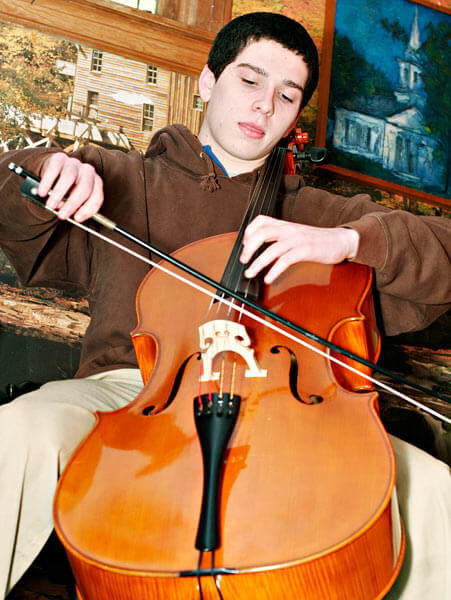By Joe Anuta
Hillcrest’s Conor McNally was surprised when an organization offered to loan him a cello worth $10,000, but the 16-year-old was truly shocked when it arrived in the mail with a broken neck.
“I was just astonished,” the St. Francis Preparatory School student said as he recalled opening the instrument case in November. “It was broken and I couldn’t even play it. I was wondering how it could be fixed.”
McNally has played the cello for nine years, and in October applied to a Seattle group called The Carlsen Cello Foundation for a chance to receive a professional-quality instrument on loan for free.
His father taped him playing “Flight of the Bumblebee,” a classical music piece written by Nikolai Rimsky-Korsakov that is often used to demonstrate speed and agility on stringed instruments.
The tune was used by a man named John “Dr. Hot Licks” Taylor to earn the Guinness Book of World Records’ fastest guitar player award last year, and McNally’s version does not disappoint either, looking as if the video is being played in fast forward.
About a month after he sent in the tape, McNally received word that his cello chops had paid off and an Italian-made instrument was on its way to Queens.
The instrument arrived in a carrying case, surrounded by packing material and tightly sealed in a box marked “fragile.”
Still, when McNally cut through the layers to reach it, he found a large crack several inches long along its neck.
McNally’s father immediately called a luthier, someone who repairs stringed instruments, named Anthony Somma in Nassau County.
Somma is often tasked with repairing instruments of great value, both monetary and sentimental.
“I’m always nervous when working on people’s instruments,” Somma said in an interview with TimesLedger Newspapers.
He has been repairing woodwind and stringed instruments for 40 years for professional and amateur musicians, and said McNally’s problem luckily was not out of his powers.
In fact, he just slapped some glue in the crack and sealed it up.
“It wasn’t a huge deal,” Somma said.
The instrument then returned to Queens once again, where McNally can be heard playing it in the family’s Hillcrest home. McNally said he hopes to one day go to college and earn a degree in music.
And the best part? The cello can come with him.
The Carlsen Cello Foundation loans out the instruments to promising young musicians with the expressed intent they use it to attain a higher education or take their musical careers to a point where they can afford their own cello.
The foundation is the brainchild of Ray Carlsen, a Seattle dermatologist.
Carlsen learned to play the cello as an adult, and during that time came across a lot of talented students who were working with inferior instruments.
“I found out that a lot of talented kids were playing on instruments that did not match their drive and the quality of their playing,” he said.
So Carlsen started buying old cellos at auctions and taking donations.
He currently has about 85 cellos ranging in value from $5,000 to $20,000, and mails them off to any student across the country who he thinks deserves one.
“I admit that it’s not altogether altruistic,” he said.
Carlsen derives great satisfaction from helping out struggling musicians, some of whom have gone on to prestigious music institutions like The Juilliard School in Manhattan or the Curtis Institute of Music in Philadelphia. Once the students reach a comfortable point in their music careers, they send the cellos back.
And one day he hopes to receive McNally’s in the mail — preferably with no cracks.
Reach reporter Joe Anuta by e-mail at januta@cnglocal.com or by phone at 718-260-4566.



































